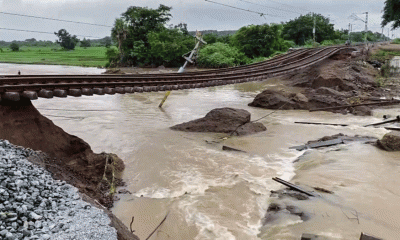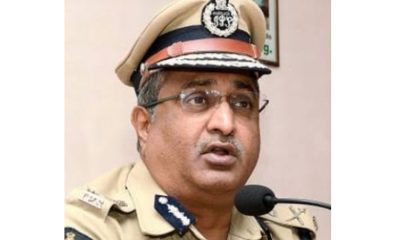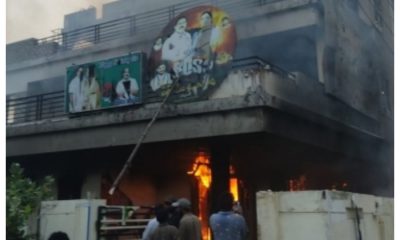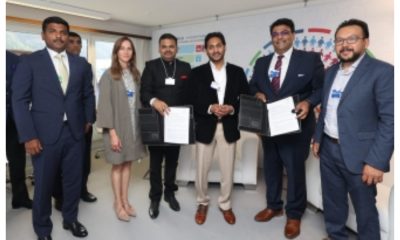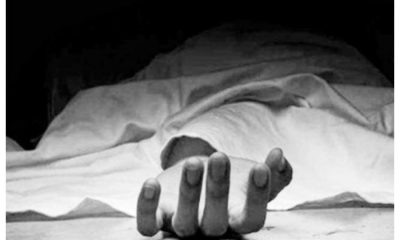National News
TDP Mahanadu: Chandrababu Naidu gives ‘Quit Jagan, save Andhra Pradesh’ slogan
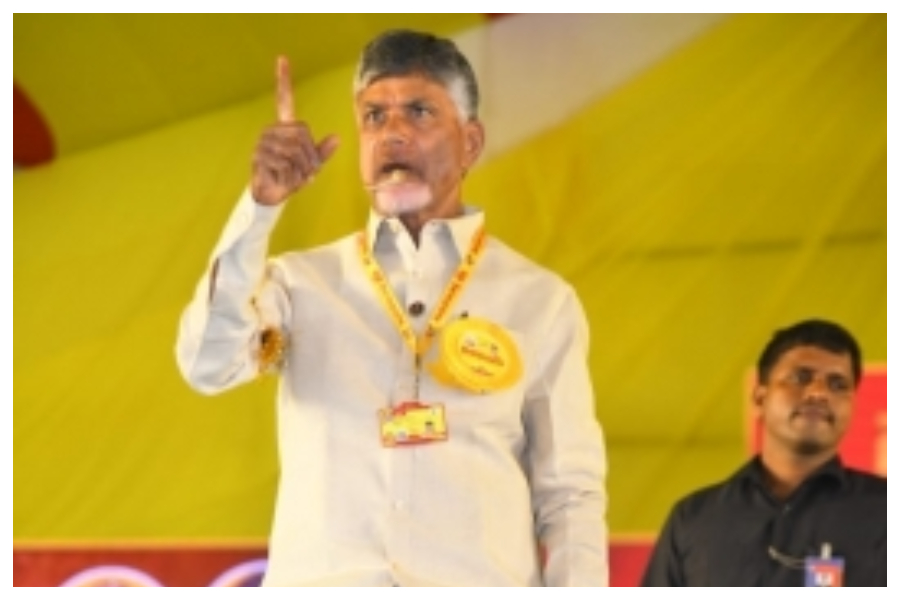
Telugu Desam Party’s annual conclave Mahanadu began here on Friday with the party chief N. Chandrababu Naidu giving a call “Quit Jagan, save Andhra Pradesh”.
Addressing the inaugural session of the two-day conclave, the former chief minister termed Y. S. Jaga Mohan Reddy-led government a “curse” and called upon people to throw it out of power.
Setting the tone for deliberations, Naidu launched a bitter attack on YSR Congress Party (YSRCP) for its “misrule” and the “havoc” it created by letting loose “repression” during the last three years.
He called the YSRCP government a rule by “maniacs, liars and corrupt criminals”. The TDP chief said with maniacs in power, the state has lost its honour and dignity.
He described Jagan Mohan Reddy as an “inefficient leader” who has been presiding over a rule by maniacs, liars and hardcore corrupt criminals.
The TDP chief asserted that if Jagan Reddy would not quit politics, AP would not see good and happy days again. All sections should unitedly raise the slogan of “Quit Jagan” so as to save Andhra Pradesh from future destruction, he said.
He alleged that the Jagan government is crushing people with its betrayal in the name of welfare, all-round looting and unbearable taxes. He said the YSRCP government made the state bankrupt with Rs 8 lakh crore debts.
Naidu alleged that YSRCP is inefficient to rule the state and hence it was using police to book false cases against those questioning its misrule. He appealed to all police personnel from constable to Director General of Police not to become tools in the hands of maniacs.
With the party holding its Mahanadu after a gap of three years, Naidu through his speech tried to lift the spirits of the party cadres.
Naidu urged party cadres to continue working the same spirit for next two years and go to people with the slogan of “Quit Jagan, save Andhra Pradesh”.
Stating that TDP has a glorious history of 40 years, Naidu vowed to build young leadership to take the party forward over the next 40 years.
The TDP chief said the chief minister signed “fake MoUs” at Davos with the same companies that worked under the TDP rule. The agreement with Adani Data Centre was signed during the TDP rule but Jagan Reddy cancelled the same and signed a more or less similar MoU with that company at Davos now.
Over 12,000 TDP leaders from across the state are attending the conclave which will pass 17 resolutions on various subjects.
The TDP organises “Mahanadu” every year in May, coinciding with the birth anniversary of party founder and former chief minister N. T. Rama Rao.
After the TDP debacle in the 2019 elections, Mahanadu was not conducted. The annual conclave was conducted in a virtual mode in 2020 and 2021 due to the Covid-19 pandemic.
The TDP completed its 40 years in March this year. It was on March 29, 1982 that N. T. Rama Rao, a popular Telugu actor, formed the TDP on the slogan of Telugu self-respect.
NTR, as he was popularly called, created a record of sorts by coming to power within nine months of forming the party.
He died in January 1996, a few months after his son-in-law Chandrababu Naidu led a revolt against him to become the chief minister of then undivided Andhra Pradesh. Naidu-led TDP to power in 1999 and remained chief minister till 2004, when Congress wrested the power.
After bifurcation of Andhra Pradesh, TDP formed the first government in the residuary state. In 2019, the party lost power to YSRCP.
Crime
Thane Crime Branch Busts Major Drug Racket, Seizes 638 Kg Ganja Worth ₹2.04 Crore, One Arrested

Thane: The Thane crime branch has arrested a 36-year-old man and seized 638 kg of marijuana worth about ₹2.04 crore during an operation on December 30.
The accused has been identified as Chinna Tagur Laxman Nayak, a resident of Mehabubnagar district in Telangana, who would often ferry the drugs from Odisha and Telangana to the city.
Acting on a tip-off, the property cell of the crime branch learned that a large drug consignment was being brought to Thane. A trap was laid at Kharegaon toll naka in Kalwa on the Mumbai–Nashik highway, and the police intercepted an Innova and found 638 kg of ganja hidden inside the vehicle. The drugs are estimated to be worth ₹2.04 crore in the illicit market.
The accused has been booked under relevant sections of the Narcotic Drugs and Psychotropic Substances (NDPS) Act. He was produced before a local court and has been remanded to police custody till January 3.
We suspect that an entire gang is operating in the region, and we will soon trace the remaining members- Amarsinh Jadhav
Amarsinh Jadhav, deputy commissioner of police (Crime), said , “Our team is investigating further to identify the source of the contraband and the individual to whom the consignment was to be delivered. We suspect that an entire gang is operating in the region, and we will soon trace the remaining members.”
Business
New labour codes bring on board gig workers with 90-day employment

New Delhi, Jan 2: The Ministry of Labour and Employment has published the draft rules for the four labour codes, which also bring gig workers on board for various benefits such as minimum wage, health, occupational safety, and social security coverage.
The government has invited feedback from stakeholders on these draft rules and aims to finally roll out the entire package of four labour codes across the country from April 1.
Under the draft rules, in order to be eligible for the benefits, a gig or platform worker must be associated with an aggregator for at least 90 days in a financial year to qualify for social security benefits created by the Centre. If a worker is engaged with more than one aggregator, the minimum requirement is fixed at 120 days.
The notification, dated December 30, 2025, was issued a day before the gig and platform workers went on a flash strike for higher wages and better working conditions.
The rules clarify that a worker is considered “engaged” on any calendar day if they earn income for work done for an aggregator, regardless of how much they earn.
If a worker is associated with multiple aggregators, the number of engagement days will be added together across all aggregators. The draft also states that if a worker is engaged with three aggregators on the same calendar day, it will be counted as three separate days of engagement.
Regarding the minimum wage, the draft rules state that when the rate of wages for a day is fixed, then such amount shall be divided by eight for fixing the rate of wages for an hour and multiplied by twenty-six for fixing the rate of wages for a month. In case of a five-day working week, the hourly rate of minimum wages so calculated shall be used to derive the minimum wages for the day.
While fixing the minimum rates of wages, the Central government shall take into account the geographical area, experience in the area of employment, and level of skill required for working under the categories of unskilled, semiskilled, skilled, and highly skilled, the rules further state.
The four codes — the Code on Wages, 2019; the Industrial Relations Code, 2020; the Code on Social Security, 2020; and the Occupational Safety, Health and Working Conditions Code, 2020 — were notified on the same day.
The Labour Codes make it mandatory for employers to issue appointment letters to all workers, which provides written proof to ensure transparency, job security, and fixed employment. Earlier, no mandatory appointment letters were required.
Under the Code on Social Security, 2020, all workers, including gig and platform workers, will get social security coverage. All workers will get PF, ESIC, insurance, and other social security benefits. Earlier, there was only limited security coverage.
Under the Code on Wages, 2019, all workers will receive a statutory minimum wage payment, and timely payment will ensure financial security. Earlier, minimum wages applied only to scheduled industries or employments and large sections of workers remained uncovered.
National News
‘How Does It Matter…’: AIMIM’s Waris Pathan Reacts To KKR Signing Bangladesh’s Mustafizur Rahman In IPL Auction.

Mumbai: With political controversy erupting over Kolkata Knight Riders (KKR) selecting Bangladeshi fast bowler Mustafizur Rahman for the upcoming Indian Premier League (IPL) 2026 season, AIMIM national spokesperson Waris Pathan pointed out that earlier the Indian government had permitted India–Pakistan cricket matches despite strained relations. “When it comes to cricket, how does it matter who supports what?” Pathan said
Though Pathan condemned the atrocities against Hindus in Bangladesh, he added that earlier India suffered greatly due to terrorism, yet matches were still played for commercial reasons.
“We had objected to it because Pakistan has been the biggest propagator of terrorism, and India has greatly suffered because of it… In Pahalgam, they came and killed innocent tourists in the name of religion. India still played a match against Pakistan for money.”
Speaking of his stand on the current KKR selecting Bangladeshi player, Pathan said, “I reject money that puts my country’s pride and dignity into question.”
Shiv Sena leader Sanjay Nirupam urged actor and KKR co-owner Shah Rukh Khan to reconsider the decision, arguing that removing the Bangladeshi player would be “for his own good” and in the interest of the country.
He claimed that with public anger directed at Bangladesh over recent developments, any association with Bangladeshi nationals could provoke backlash.
“When the entire country is enraged and angry at Bangladesh, anyone in India who has even the slightest connection to Bangladeshis could become a target of that anger,” he added.
India and Bangladesh share long-standing diplomatic, cultural and economic ties, with cooperation across trade, connectivity, and security. However, the relationship has seen periods of strain in recent times due to political developments and security concerns in the region. There have been instances of violence against Hindus in the country in recent times.
-

 Crime3 years ago
Crime3 years agoClass 10 student jumps to death in Jaipur
-

 Maharashtra1 year ago
Maharashtra1 year agoMumbai Local Train Update: Central Railway’s New Timetable Comes Into Effect; Check Full List Of Revised Timings & Stations
-

 Maharashtra1 year ago
Maharashtra1 year agoMumbai To Go Toll-Free Tonight! Maharashtra Govt Announces Complete Toll Waiver For Light Motor Vehicles At All 5 Entry Points Of City
-

 Maharashtra1 year ago
Maharashtra1 year agoFalse photo of Imtiaz Jaleel’s rally, exposing the fooling conspiracy
-

 National News1 year ago
National News1 year agoMinistry of Railways rolls out Special Drive 4.0 with focus on digitisation, cleanliness, inclusiveness and grievance redressal
-

 Maharashtra1 year ago
Maharashtra1 year agoMaharashtra Elections 2024: Mumbai Metro & BEST Services Extended Till Midnight On Voting Day
-

 National News1 year ago
National News1 year agoJ&K: 4 Jawans Killed, 28 Injured After Bus Carrying BSF Personnel For Poll Duty Falls Into Gorge In Budgam; Terrifying Visuals Surface
-

 Crime1 year ago
Crime1 year agoBaba Siddique Murder: Mumbai Police Unable To Get Lawrence Bishnoi Custody Due To Home Ministry Order, Says Report



